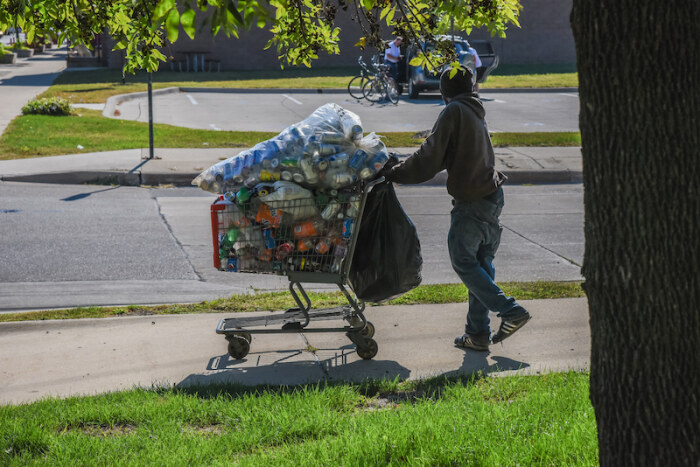Terese Grant and Linda Schreiber co-authored this commentary. Bills pending in the Iowa House and Senate would allow retailers to stop accepting recyclable containers.
Droppett CEO and President Doug Webb painted a rosy picture of his company’s recycling system in a January guest editorial for the Cedar Rapids Gazette. Droppett is owned by CRINC, which is owned by Doll Distributors (Budweiser) and Iowa Beverage Systems (Miller/Coors).
Recycling declined dramatically during the global COVID-19 pandemic after Governor Kim Reynolds gave retailers the option to suspend redemption.
The two largest retailers took different paths. Fareway discontinued redemption and does not accept containers; it does have agreements with redemption centers. Hy-Vee continued redemption at locations equipped with reverse vending machines and partnered with nearby redemption centers.
If bottle and can redemption is limited to Droppett systems only, recycling may decline further, producing more unclaimed money for distributors (already estimated to be in the tens of millions of dollars).
As Americans recycled less during the pandemic, some reports last year predicted container shortages would disrupt the supply chain for aluminum and glass, leading to major shortages by 2023. If the forecasts hold true, Iowa’s craft beer and wine industries could be threatened.
The Droppett website claims the company makes it easy for consumers to recycle and save money. It also says its recycling is clean and convenient. “Clean” is the biggest complaint heard from the grocery industry, and the main reason grocers say they want redemption services out of their stores.
Under the current Iowa container redemption law, more commonly known as the bottle bill, distributors are required to pick up the redeemed bottles and cans from retailers. Retailers complain that distributor pickups are not made on a regular or timely basis, and the one-cent handling fee is not sustainable. Some grocers have stopped redemption, because they know state government doesn’t bother to enforce the law, and potential fines would be insignificant.
If distributors were following the law and picking up containers more frequently, would this new Droppett system even be needed?
Mr. Webb’s editorial didn’t address the following questions and concerns about his business model:
- Where will Droppett units/trailers be located?
- Who pays for the trailers? Who is responsible for cleaning, maintaining and staffing the trailers?
- Who pays for the electricity and data lines to operate the Droppett units/trailers?
- Do the trailers conform to existing zoning and parking lot requirements?
- Will the empty containers dropped off at Droppett collection sites be picked up on a regular and timely basis?
Is Droppett the answer to Iowa’s outdated bottle bill? It’s not that simple. Droppett users must create online a unique username (that is not the same as your email address) and password (4-digit PIN). After registering for an account, users receive ten free bags and tags for their key chain or wallet. Additional bags can be purchased at a cost of $2.49 plus tax for ten bags.
Droppett encourages users to use their green redemption/recycling bags, which are 100 percent recyclable and withstand the weight of the redeemable containers and Iowa’s temperature variances. Glass bottles can be placed in a securely taped box and tagged on the top of the box. Both bags and boxes are limited to a weight of 20 pounds.
Only plastic, aluminum, or glass beverage containers designated with Iowa’s deposit insignia indicating a deposit was paid at purchase are eligible for redemption. Although there is no redemption value, non-eligible containers can be placed in Droppett bags so long as they are sturdy plastic, aluminum, or glass beverage containers that resemble the containers covered by the bottle bill.
After filling a Droppett bag with empty containers, users tag it with an identification sticker and drop it off at a collection site. No receipt is offered at the drop off, though the bags are logged into Droppett software when each individual sticker tag is scanned.
The deposit amount shows up on a user’s account after the containers have been picked up and taken to the processing facility and scanned.
Only after your containers have been picked up and brought back to the processing facility will your account show how much you have redeemed. (Processing of your bags may take 48-72 hours depending on current volume, not including holidays and weekends.)
There is no way to resolve deposit disputes, because the customer does not receive a receipt.
To access deposit funds, users must log on to the website to see what funds are available. An account balance of $15 or greater is required to move funds from a Droppett account to a personal checking account. (“Transfer may take 24-48 hours not including holidays and weekends.”) An exception can be made for a lower balance, if users choose to donate funds to one of the Droppett “partner charities.”
This system does not work for individuals who are low-income and lack access to the internet or banking services. They need cash for the bottles and cans they collect, to buy necessities like food or to pay for utilities at retail locations.
Mr. Webb is right about one thing: Iowa’s bottle bill must be modernized. The best option for consumers is access to clean, modern, and convenient facilities where they shop. Reverse vending machines are the ideal solution, and they are used all over the world.
Terese Grant is president of the League of Women Voters of Iowa. Linda Schreiber is a bottle bill advocate and member of the League of Women Voters of Johnson County.
Top photo by Rosemarie Mosteller, available via Shutterstock: Man collecting containers for recycling in Cedar Rapids on August 17, 2014.


1 Comment
Just increase the fee to redemption centers.
Raise it to 3 cents.
cocinero Sun 10 Apr 4:08 PM